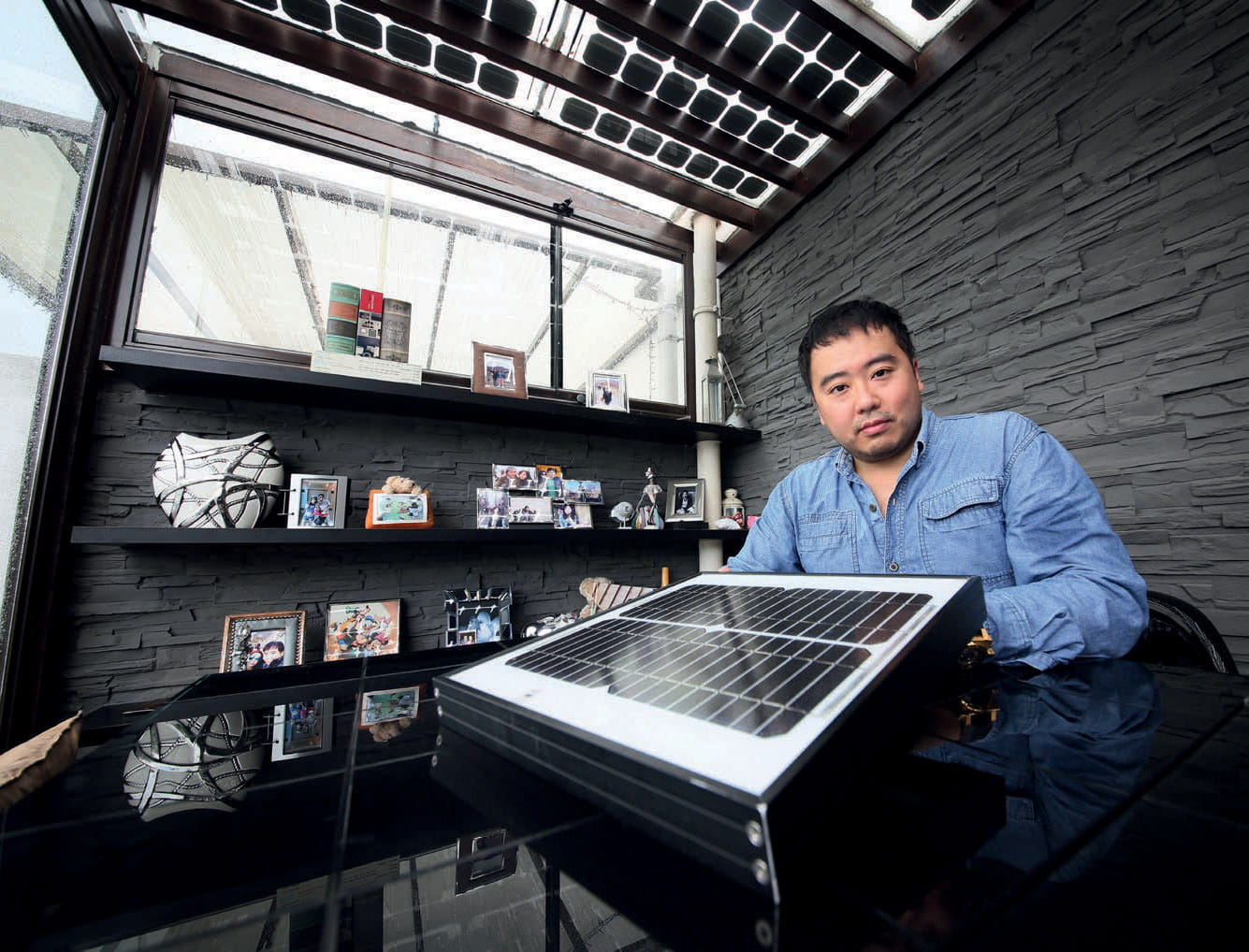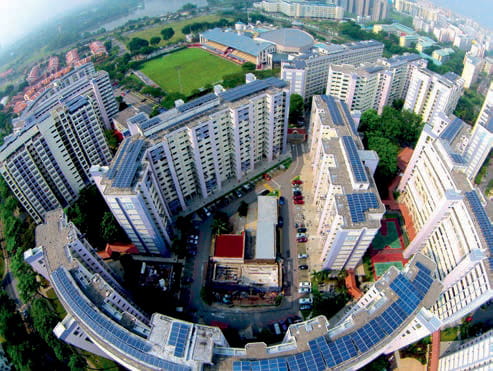Stories > Let Solar Shine
Let Solar Shine

Sunseap Groupʼs co-founder and director, Frank Phuan, walks the talk by installing solar panels on the roof of his house.
Singapore-based solar firm Sunseap Group helps urban and rural communities in Asia access clean energy through the development of solar farms.
BY SASHA GONZALES
PHOTOS SPH LIBRARY, SUNSEAP GROUP
n tropical Singapore, solar power is a renewable energy source that can be easily harnessed so long as there is available space. It is also a clean source of energy as no greenhouse gas is produced when it is used to generate electricity.
Despite the environmental benefits, solar energy accounts for only about 1.5 per cent of Singapore’s total electricity needs in 2016, or about 126 megawatt peak (mwp). The country aims to have 350 mwp of solar energy by 2020 to meet 5 per cent of its total electricity needs.
Apart from a lack of available space to deploy solar energy on a large scale due to Singapore’s small physical size, another obstacle is the cost of installing solar photovoltaic systems (a power system that uses solar panels to convert light to electricity).
Home-grown solar company Sunseap Group, cofounded by Lawrence Wu and Frank Phuan in 2011, is a pioneer in promoting the adoption of solar energy in Singapore. Both Wu and Phuan are directors at the company. Wu says: “It is our mission to deliver sustainable energy solutions to everyone.”
Sunseap is now the country’s largest renewable energy solutions provider, helping building owners adopt solar energy through innovative solutions. In Singapore, it has installed solar panels on the rooftops of commercial and industrial buildings, and residential properties, as well as floating photovoltaic systems on one of Singapore’s reservoirs.
Wu says that the company currently has over 80 per cent of Singapore’s solar market share, and almost 200 mwp of contracted solar projects in the country. Its solar energy solution has also achieved grid parity in Singapore. This means that it is able to offer solar energy at a price equal to or cheaper than what is provided by the traditional electricity grid.
“ We hope to improve the lives of residents in rural areas of emerging economies by giving them access to a clean commodity that we in many developed countries take for granted. ”
Lawrence Wu, Sunseap Groupʼs co-founder and director
GOING REGIONAL
In the last few years, it has built on its success in Singapore to become a regional player. The company has played an integral role in the proliferation of clean energy around South-east Asia and the Pacific, specifically in Malaysia, India, Thailand, the Philippines, Cambodia and Australia. It has over 200 mwp of contracted projects in the region. The company is also currently in discussions for several projects in Vietnam.
Last year, the company scored two major contracts that will see it extend its reach further into countries with tremendous potential for solar development – Cambodia and India.
Last August, the company won a government tender to build the first large-scale solar farm in Bavet City, located on the border between Vietnam and Cambodia, in Cambodia’s Svay Rieng province. The total energy needs of Bavet City and Svay Rieng add up to about 40 mwp, half of which is imported from neighbouring countries.
When the 10 mwp solar farm, about the size of 10 football fields, begins operations in August this year, it will help to meet a quarter of the energy demands of the city. As part of this project, Sunseap will also supply power to Electricite Du Cambodge, Cambodia’s state-run energy utility, for 20 years.
The project will help to increase Cambodia’s energy security, and also help the country cut its greenhouse gas emission by 5,500 tonnes of carbon dioxide annually. It also helps to fulfil Cambodia’s plan to provide electricity to all villages in the country by 2020. At present, around 66 per cent of its villages have access to gridquality electricity.
Apart from the environmental gains, the solar project is also expected to create more than 100 jobs. Sunseap will run a training programme to share technological knowledge on operating solar systems with the Cambodian community. Phuan says: “There is a lot of potential in Cambodia for solar development, particularly in rural electrification. We hope this project will provide an impetus for future solar projects in Cambodia.”
Sunseap is also part of a joint venture that is undertaking the largest solar project by a Singapore company in India, with the development of a solar power plant with its partners in the northern state of Rajasthan.

Sunseap Group has installed solar photovoltaic systems on the roofs of hundreds of public housing blocks around Singapore.
The large-scale project includes the building of a solar farm with a capacity of 140 mwp at peak conditions. Sunseap and its partners will also supply power to National Thermal Power Corporation, India’s state-owned power company, for 25 years. The project is expected to begin commercial operations in the second quarter of this year.
Wu says that his company has come a long way in delivering bankable, clean energy solutions that allow its clients to utilise affordable and clean energy. He adds: “Looking ahead, we hope to improve the lives of residents in rural areas of emerging economies by giving them access to a clean commodity that we in many developed countries take for granted.”
